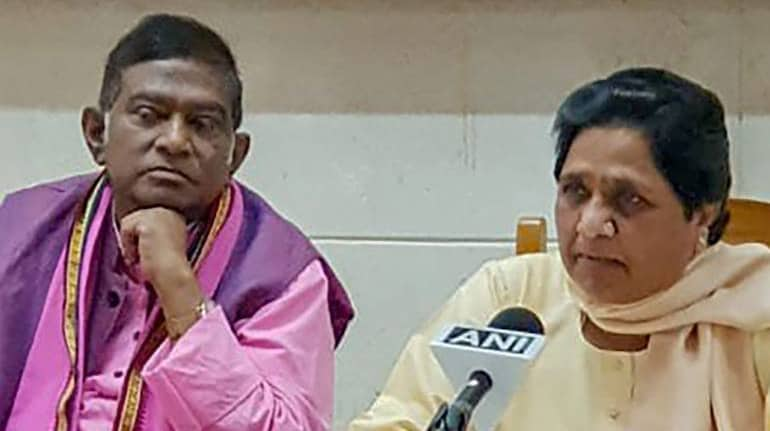



Bahujan Samaj Party (BSP) chief Mayawati on September 20 set political circles abuzz with her announcement of a tie-up with Janata Congress chief Ajit Jogi for the upcoming Chhattisgarh assembly elections.
The Times of India reported on how the tie-up was a hush-hush affair, with the wheelchair-bound Jogi being brought into Lucknow from Delhi via road, instead of an air or rail route. That was not without purpose — Mayawati wanted neither Samajwadi Party (SP) nor the Congress to get an inkling of what was in the offing, according to reports.
Before the announcement, the Congress was reportedly trying to build an alliance with the BSP in Chhattisgarh and Madhya Pradesh. Reports of senior Congress leader Kamal Nath being in talks with Mayawati on a seat-sharing agreement were doing the rounds, and it was widely believed by observers that a Congress-BSP alliance in Madhya Pradesh would be beneficial for the Grand Old Party. According to a report in NDTV, senior Congress leaders in Madhya Pradesh admitted that Mayawati’s announcement would make things difficult for the party in the central Indian state. However, they stated that an alliance may still be in the offing.
“A tie-up with Mayawati may still happen. It’s just that she has introduced a new bargaining chip,” a Congress source told the news channel.
Why Mayawati matters
Mayawati’s stock, in so far as Madhya Pradesh is concerned, rose after widespread support to a shutdown called by Schedule Caste groups in the state’s Gwalior-Bhind region bordering Uttar Pradesh. The shutdown in April was a response to the Supreme Court order on SC/ST (Prevention of Atrocities Act).
Moreover, Mayawati’s tie-up announcement was meant to serve as a double whammy for the Congress, since Jogi is a Congress rebel who floated his party in 2016. Jogi had resigned after his son and then Congress legislator Amit Jogi was suspended following anti-party activities.
Another purpose that Mayawati served through her announcement was giving out a clear message to the Congress top brass on seat-sharing, not just for the assembly elections but also for next year’s general elections. According to reports, Congress was willing to give Mayawati five seats in Chhattisgarh, as opposed to the 35 that BSP will now fight on in its partnership with Jogi.
In addition to that, Mayawati also announced candidates to 22 seats in Madhya Pradesh, which included candidates in Morena and Shivpuri, considered to be strongholds for Congress leader Jyotiraditya Scindia — this again being interpreted as a message for the party’s senior leadership to give “respectable seats” to her party.
The Chhattisgarh equation
In Chhattisgarh, BSP had contested on all 90 seats but managed to win only one during the 2013 Assembly elections. The Uttar Pradesh-based satrap had polled 4.27 percent of the vote share, but its candidates had polled more than 10 percent of the vote share in 12 seats, and more than 20 percent in five.
Jogi’s party, meanwhile, is yet to be tested at the poll booth, but the leader reportedly has considerable influence in the state’s Bilaspur region and tribal belt.
According to Hindustan Times, Jogi also has a following among the Scheduled Caste, Muslim and Christian population in over a dozen constituencies in the state, and can eat into the Congress vote bank. This is especially since in a 90-member assembly, 29 seats are reserved for tribal candidates and 10 for Scheduled Caste. In 40 other constituencies, the SC population is more than 10 percent, which is expected to benefit both BSP and Janata Congress.
BSP’s vote share is also important, considering that elections in Chhattisgarh have always been head-to-head. In 2013, the vote share difference between BJP and Congress was 1.7 percent. BSP’s 4.27 percent would have added considerable weightage to its alliance partner.
The Chandrasekhar Azad factor
Chandrashekhar Azad, the founder of Bhim Sena who was freed recently after a year in prison for his alleged role in Saharanpur caste violence, could be another factor why Mayawati chose to fire the salvo.
Azad, who had told NDTV that he would support "whoever is willing to throw out the BJP government in 2019", is a younger challenge to Mayawati's Scheduled Caste powerhouse image.
After the Shaharanpur caste violence in April-May 2017, Chandrashekhar's legend as the protector of the Scheduled Caste in the state came into being— a legend that cemented when he was in jail and extended his influence, in turn challenging Mayawati's voter base and her hopes for bargaining chips.
After his release, Azad had called Mayawati her bua, but she had refused to acknowledge the compliment.
"I want to make it clear that I have no bua-bhatija relationships. If he had the interests of Dalits at heart, he would have come to me to fight the BJP together, rather than floating his own organisation and dividing our people. This will only help the BJP, not defeat them," Mayawati had said.
After his release, Congress leader Imran Masood was one of the first leaders to have met Azad. Masood had also dismissed Mayawati's statements, stating that it was "uncharitable" of her to dismiss Azad's "show of unity".
Assembly Elections 2018: Read the latest news, views and analysis here
Discover the latest Business News, Sensex, and Nifty updates. Obtain Personal Finance insights, tax queries, and expert opinions on Moneycontrol or download the Moneycontrol App to stay updated!
Find the best of Al News in one place, specially curated for you every weekend.
Stay on top of the latest tech trends and biggest startup news.